
Boss Tells Senior Programmer To Move Back To NYC For Work, So He Quits, And The Company Quickly Realizes How Essential He Was
It’s simple: if you get great results, you get great results—it’s a matter of fact. And it doesn’t matter where you work if you have a solid work ethic and focus on providing high-quality outcomes. Jobs like programming are flexible and can be done anywhere worldwide. Unfortunately, some bosses seem to think that if you’re not in the office, you ‘must’ be slacking off, no matter how outstanding your results might be.
Redditor u/redditadmindumb87 shared a story about a buddy of his, ‘Tim,’ who is a very competent senior programmer who works with AI technology with tons of experience. During the pandemic, he moved from New York City to Michigan to enjoy a higher quality of life. However, when his boss demanded that he move back for work, he decided to quit. Things took a surprise twist when the company finally realized how essential Tim really was. However, not everyone was in agreement on whether the worker’s behavior was the best way to solve the problems he’d faced. Read on for the full story!
Bored Panda reached out to workplace expert Lynn Taylor, the author of ‘Tame Your Terrible Office Tyrant’ and the head of the fashion brand ‘Behind the Buckle,’ to hear her thoughts on the future of remote work. You’ll find our full interview with Taylor as you read on.
Many employees who get great results and work far more efficiently from home aren’t all that fired up about coming back to the office
Image credits: Djordje Petrovic (not the actual photo)
Someone shared how their friend, a senior programmer, pushed back against his company’s policy to return back to the office
The programmer had decided to move back home during the pandemic but didn’t tell any of his superiors about his decision
When his boss demanded that he go back to the office, he decided to stand up for what he valued the most
Image credits: Ono Kosuki (not the actual photo)
The company quickly realized just how essential the programmer had been
Image credits: The Coach Space (not the actual photo)
The senior employee managed to get everything that he wanted and came out on top
Tim’s friend gave redditor u/redditadmindumb87 permission to post the story on the r/ProRevenge. Unfortunately, the OP’s account got suspended for an unknown reason, so we were unable to reach out to them. The author of the post shared how Tim kept doing very high-quality work even though he was now working from Michigan.
However, he had not officially told his superiors that he’d moved there during the Covid-19 pandemic. So it came as a bit of a shock to his boss, ‘Larry,’ when the pandemic ‘ended,’ and he wanted some personnel working back at the office, not from home. But Tim wasn’t willing to sacrifice the quality of life he was enjoying just to move to NYC, which was cramped and far more punishing on his wallet. So he quit.
Fast forward a few weeks and the CEO of the company, ‘John,’ got in touch with Tim about him possibly coming back to the company. However, what the boss was offering the senior programmer wasn’t really fair: a 20% pay cut as a way to adjust for his lower cost of living outside of NYC. Having your pay slashed by a fifth for providing the same level of work is ridiculous.
The programmer refused, asked for a 15% raise, and demanded that his direct boss Larry be removed from the team. Long story short, Tim was such an experienced professional that he got everything that he asked for. This was a small victory for work-from-home proponents everywhere.
Image credits: Sora Shimazaki (not the actual photo)
Employers and employees have different perspectives on WFH
“Many industry studies put the percentage of remote jobs today at roughly 25% today. That’s a big drop from the roughly 80% remote workers during Covid. But WFH is not going away in the long term,” workplace expert Taylor explained to Bored Panda. “In the short term, between an uncertain economy and jobless claims on the rise of late, employers may hold more of the proverbial cards in the next couple of years. And that may translate to a further (temporary) drop in the number of remote jobs,” she said.
“Still, employers constantly need recruiting techniques that work, especially when there are specialized skill shortages. And remote work will always appeal to the vast majority of American workers,’ the author of ‘Tame Your Terrible Office Tyrant’ said.
Taylor shared what the perspectives on remote work are from an employer’s and an employee’s point of view.
“Remote work seems to be one of the most polarizing topics between companies and their workforce during the last couple of decades. Employers have never been thrilled about the practice, and if the power pendulum is indeed swinging back to them, we can expect even more resistance,” the expert told Bored Panda.
“Employers feel that with remote work, they have less control and are witnessing reduced productivity—because of the lack of face-to-face meetings. They believe that innovation suffers because of a lack of collaboration… and that their more junior teams are not benefiting from observing more experienced teams,” she said.
“Employees, on the other hand, believe they are more productive and more focused when working from home, while saving significant commute time. Work-life balance has always been a serious work issue and this gives workers needed latitude with their work and personal life. Employees recognize that there is a lot of downtime in the office, and some of that is due to politics—all of which can be mitigated with remote work.”
In Taylor’s opinion, work from home is here to stay because, over the last three years, it has been “so deeply ingrained in our work culture.”
“It’s been a game changer in how people view their jobs and has even increased interest in working as an independent contractor,” the expert noted.
“This workplace trend has spawned much greater self-reflection in career satisfaction and finding greater happiness overall. For many, it has been life-changing. The intrigue of remote work has spanned every generation. And with younger generation Y, Z, and Centennials all having experienced its benefits, smart employers know that this will be an important recruiting tool for years to come.”
Image credits: Polina Zimmerman (not the actual photo)
Great managers will consider what works best for their employees, not just the company
At the core of every single WFH discussion lies a simple question: what works best for a particular employee in their specific job position? If your job is to directly work with clients all day long, it’s highly likely that you’ll be asked to show up at the office at least a few days a week.
While the pandemic has taught us all that it’s perfectly possible to have remote meetings, many of us know deep in our guts that it’s far better to meet someone in person. Zoom calls aren’t as great an alternative to speaking to someone face-to-face as some would think. There’s a lot of information lost when you can’t fully see someone’s body language.
Meanwhile, some managers believe that directly interacting with other employees fosters more cooperation and a better team spirit. You’ll care more about those coworkers who you sit next to in the office, whom you eat lunch with, and whom you gossip with next to the coffee machine. On the flip side, if your colleagues are just names on a screen you sometimes message, the bond between you probably won’t be as strong.
A lot depends on the employee’s values and where they function at their peak. If they prioritize their family, hobbies, and free time, and enjoy controlling their work surroundings, they’ll be more likely to want to work from home whenever possible. Meanwhile, if someone prioritizes social interactions with their colleagues and thrives in a more dynamic atmosphere, they might not mind the long commute to the office.
As Gleb Tsipursky, Ph.D., notes on Psychology Today, most employees actually prefer hybrid or remote work. Meanwhile, research has shown that WFH productivity is “generally higher than in the office,” especially when it comes to individual tasks.
Bad managers will try to impose whatever they feel is ‘right.’ Good managers will take what’s best for each team and worker into consideration. The best way forward is to be somewhat flexible and strike a balance between what the company needs and what the employees want. After all, you don’t want your top talents to quit just because you’re stubborn about remote work due to whatever assumptions you might have.
Here’s how some readers reacted to the programmer’s story, as shared by his friend
However, not everyone was quick to agree with what the employee had done. Some questioned the entire situation
Payroll professional here. You can't just move to a different state and not tell your company. We need to register in that state to be able to withhold and pay taxes, pay state unemployment insurance, state disability charges, and state workers compensation programs. It takes months for all that paperwork to go through. People think companies are just being a******s not allowing people to move, but it's because we literally can't follow laws paying you if you do that.
Exactly... and that's why I don't believe this one.
Load More Replies...It's mentioned in a very roundabout way in one of the comments, but there are *personal* tax implications to moving states and not letting your employer know. Because of how the US operates, the company may not have permission to pay someone who works in Michigan while theyre in NY. Tim could have found himself out of a job without legal recourse. Tim's a great programmer, but not a smart man.
Yeah that was my first thought too! Even living in a neighbouring state while working in another can be complicated.
Load More Replies...While Larry is most certainly an AH, Tim also comes off as one here, in my opinion. There's a difference between knowing your worth and being an overly demanding, arrogant smartarse. He comes off as the latter, to me. I can't believe that the CEO is the only one who comes out of this in a halfway-decent light.
Yeah.... Plus nowadays applications and work-sharing techniques are made in a way that allows the entire team to work on any part of the code. If this story is true, the guy was allowed to write code in a old fashioned way having the sole purpose to make the coder hardly replaceable.
Load More Replies...Payroll professional here. You can't just move to a different state and not tell your company. We need to register in that state to be able to withhold and pay taxes, pay state unemployment insurance, state disability charges, and state workers compensation programs. It takes months for all that paperwork to go through. People think companies are just being a******s not allowing people to move, but it's because we literally can't follow laws paying you if you do that.
Exactly... and that's why I don't believe this one.
Load More Replies...It's mentioned in a very roundabout way in one of the comments, but there are *personal* tax implications to moving states and not letting your employer know. Because of how the US operates, the company may not have permission to pay someone who works in Michigan while theyre in NY. Tim could have found himself out of a job without legal recourse. Tim's a great programmer, but not a smart man.
Yeah that was my first thought too! Even living in a neighbouring state while working in another can be complicated.
Load More Replies...While Larry is most certainly an AH, Tim also comes off as one here, in my opinion. There's a difference between knowing your worth and being an overly demanding, arrogant smartarse. He comes off as the latter, to me. I can't believe that the CEO is the only one who comes out of this in a halfway-decent light.
Yeah.... Plus nowadays applications and work-sharing techniques are made in a way that allows the entire team to work on any part of the code. If this story is true, the guy was allowed to write code in a old fashioned way having the sole purpose to make the coder hardly replaceable.
Load More Replies...
 Dark Mode
Dark Mode 

 No fees, cancel anytime
No fees, cancel anytime 











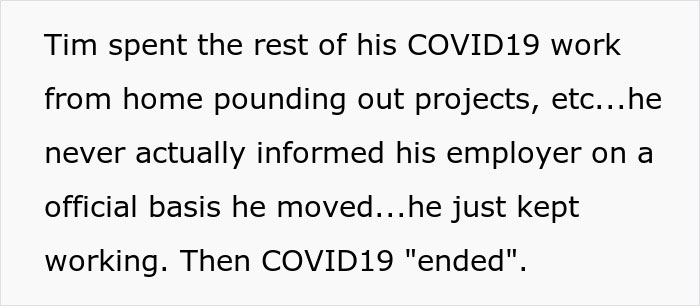
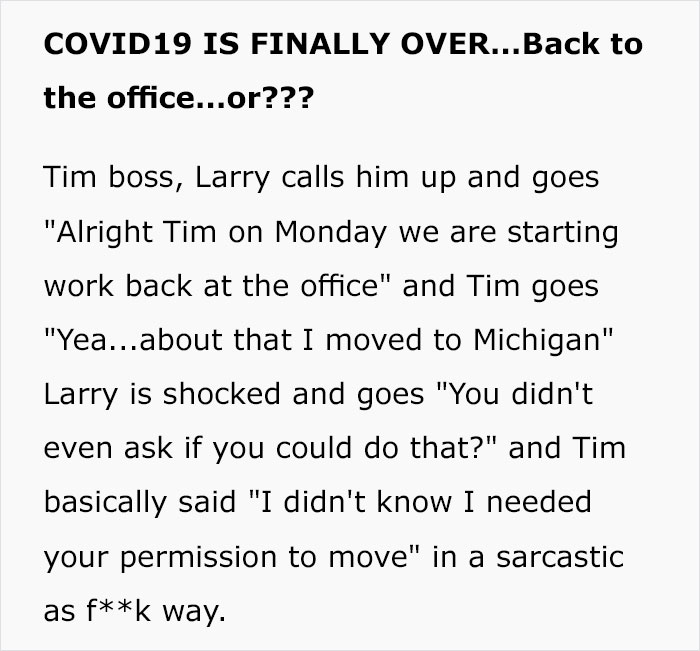


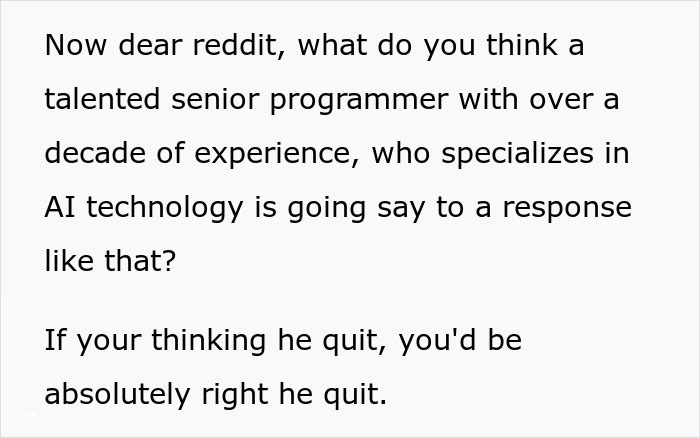



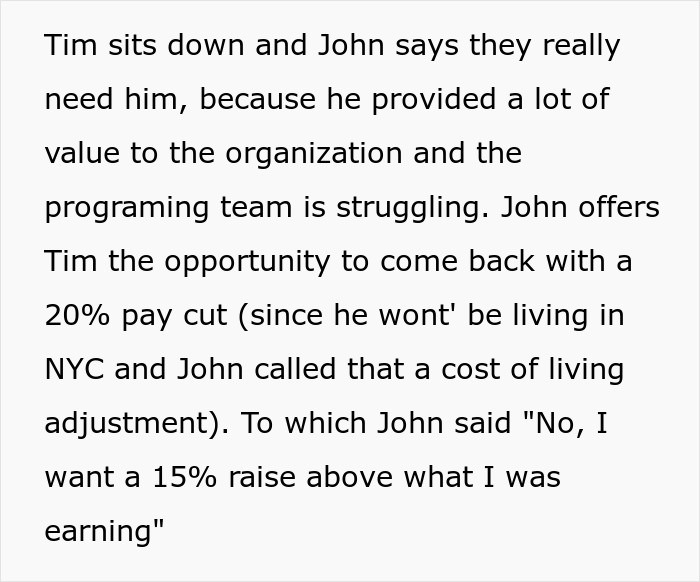



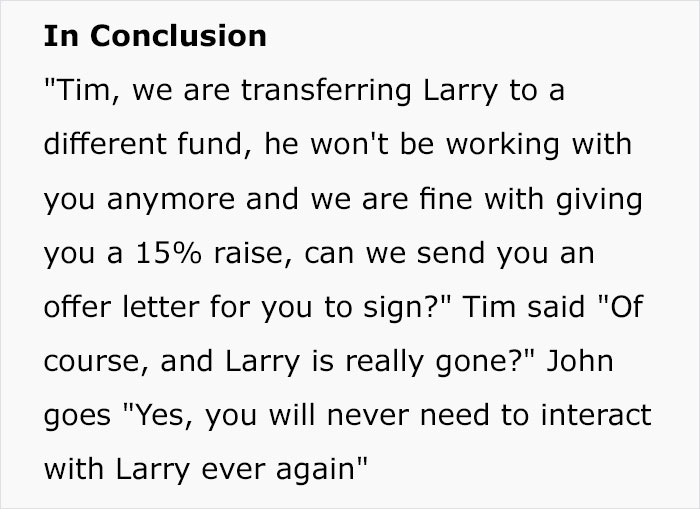





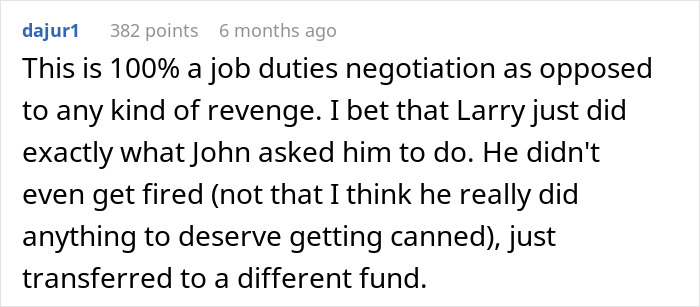
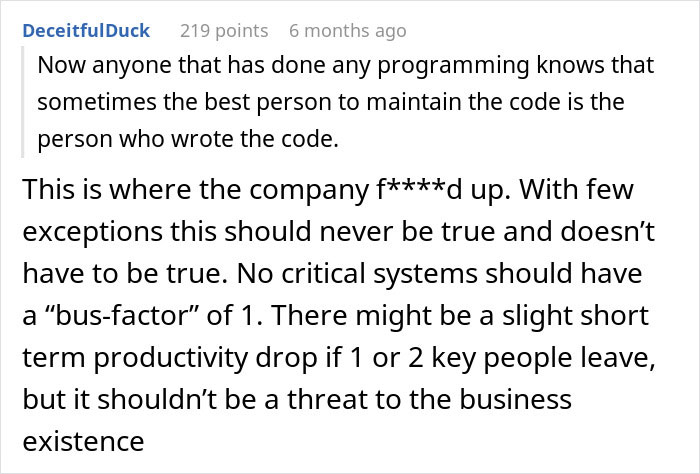




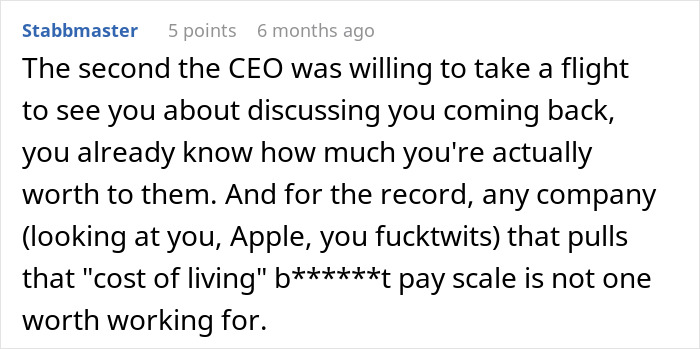
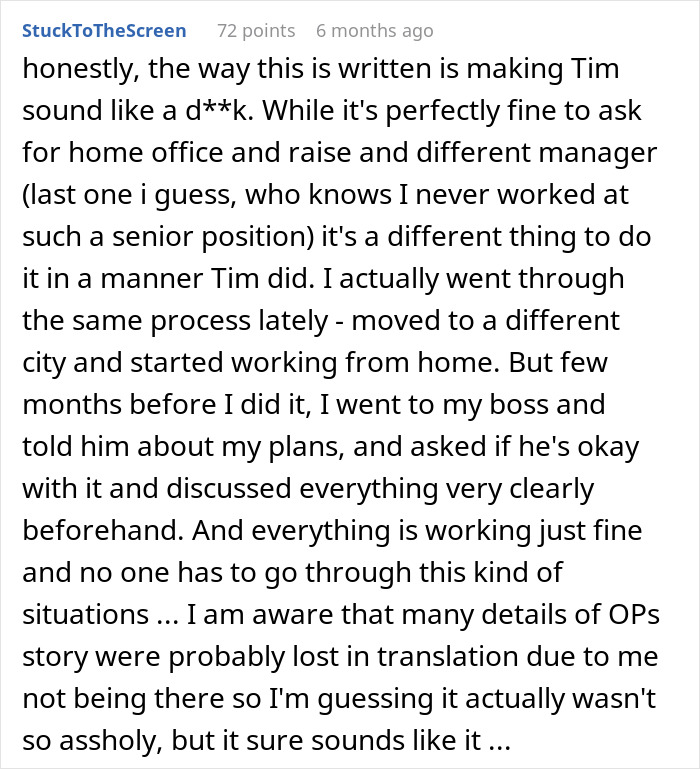
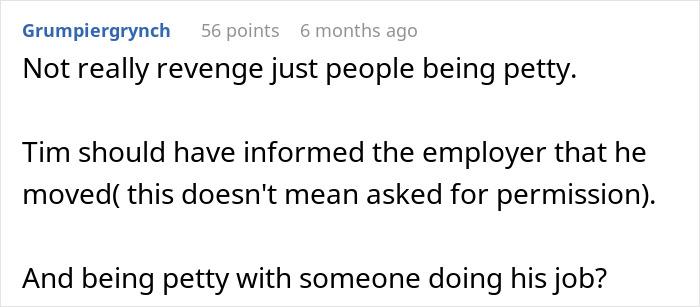
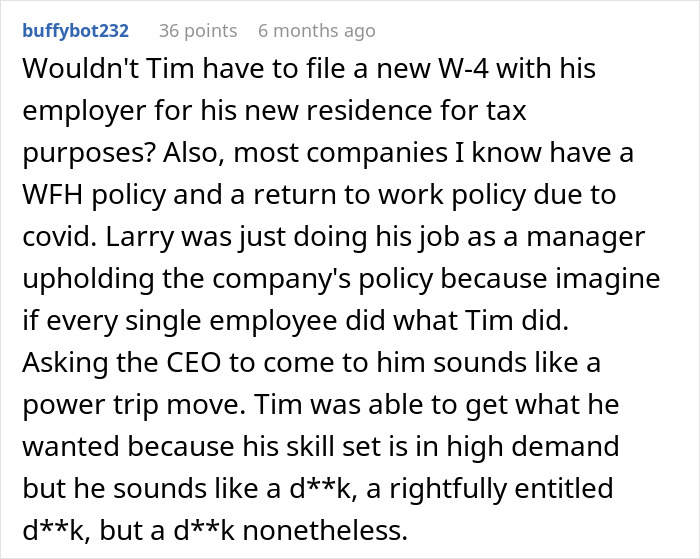















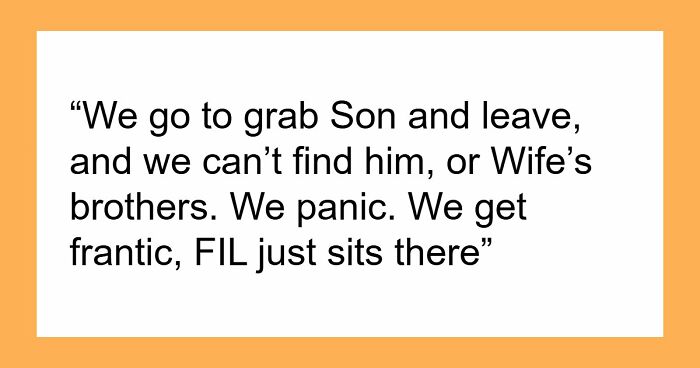






























76
66